G7 leaders meet as Poland, Hungary hold crisis meetings after deadly missile strike
World leaders are backing an urgent investigation into how a deadly missile exploded in Poland, as the finger-pointing turns from Russia to Ukraine and back again.
World
Don't miss out on the headlines from World. Followed categories will be added to My News.
Global security tensions are at their highest point since the start of the war in Ukraine after a missile crossed into Poland and killed two people.
The men, aged about 60, were killed when a missile hit the southeastern Polish village of Przewodow, some six kilometres from the Ukrainian border, on Tuesday afternoon.
The deadly strike, which Polish Foreign Ministry claimed was from a Russian-made missile, prompted fears of an escalation of the conflict and sparked a flurry of emergency talks between world leaders in Bali for the G20 summit.
But early assessments appear to have found the missile was part of Ukrainian air defences attempting to fend off a Russian missile attack on Ukraine.
Ukraine President Volodymyr Zelenskyy called for Ukraine’s allies to share “all the data” held on the missile that landed in Poland.
“We want to establish all the details, each fact. That’s why we need … access to all the data that our partners have and the site of the explosion,” Mr Zelenskyy said in his nightly address.
Russia, which invaded Ukraine in February, immediately came under suspicion.
But Polish Prime Minister Mateusz Morawiecki said on Wednesday that “materials collected by our services and provided by our allies most probably indicate that the explosion in Przewodów, in eastern Poland, was caused by the shooting down and destruction of a Russian missile.”
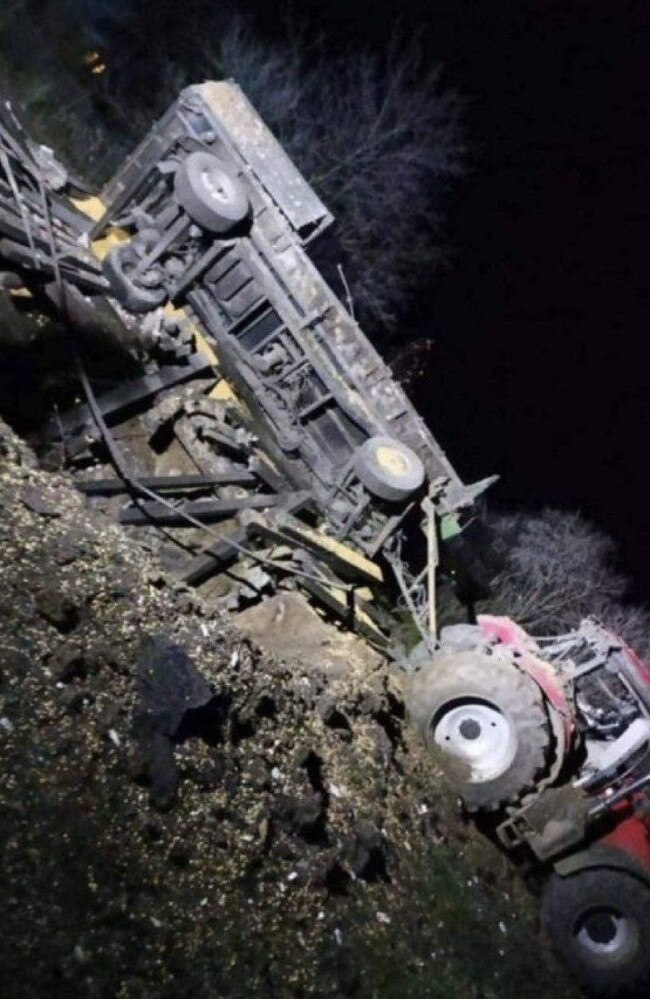
Polish President Andrzej Duda said that the missile was “probably an accident” from Ukraine’s air defences.
However, the “party ultimately responsible” for the incident is Russia for its ongoing invasion, according to National Security Council spokesperson Adrienne Watson.
“We have full confidence in the Polish government’s investigation of the explosion near their border with Ukraine, and we commend them for the professional and deliberate manner in which they are conducting it,” Ms Watson said in a statement issued on Wednesday.
“We have seen nothing that contradicts President Duda’s preliminary assessment that this explosion was most likely the result of a Ukrainian air defence missile that unfortunately landed in Poland.
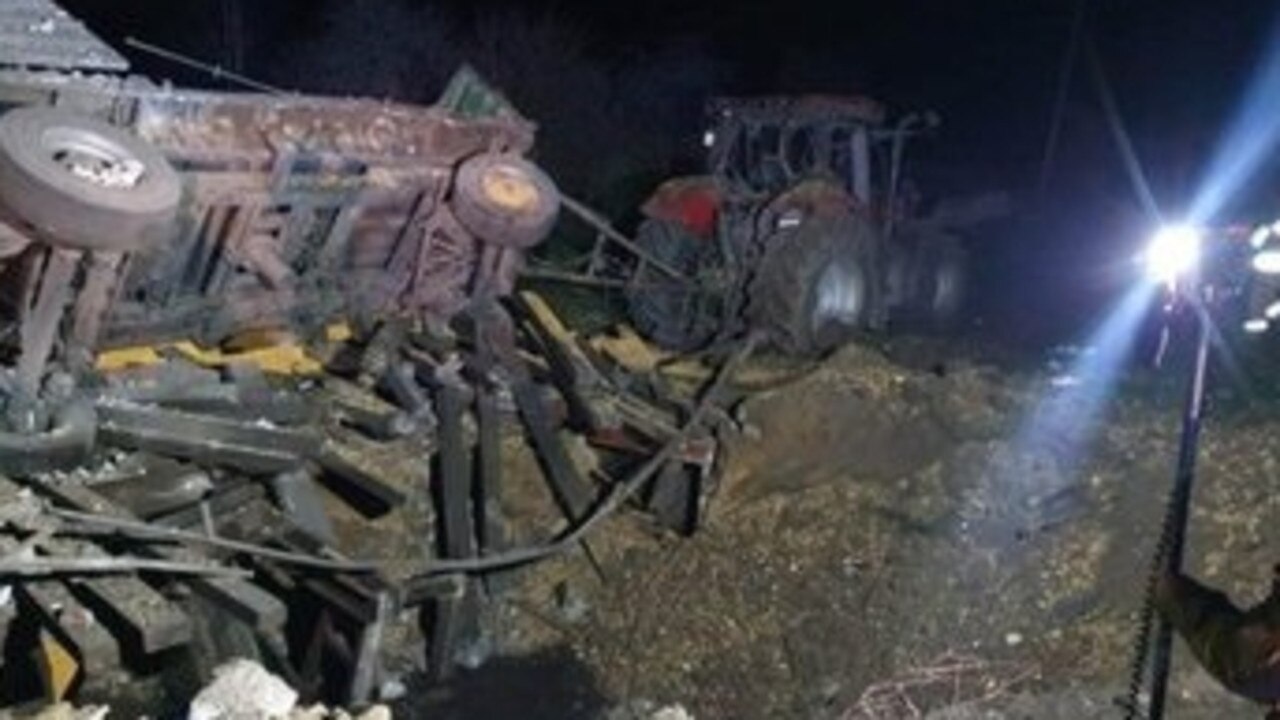
Russia blamed Ukraine’s air defence system for the missile explosion and said there was “a deliberate provocation in order to escalate the situation.”
Aerial weapons expert Pierre Grasser from the Paris-based Sirice research institute identified the missile type as 5V55, which is used by the Ukrainian army.
“The blast was most probably an accident involving a Ukrainian surface-to-air missile which missed its target or got out of control,” Mr Grasser told AFP.
He added NATO systems would most probably have noticed a similar missile fired from nearby Belarus, which is Russia’s ally.
“We want to establish all the details, each fact. That’s why we need … access to all the data that our partners have and the site of the explosion,” Zelensky said in his nightly address.
RUSSIA FALLS INTO RECESSION
Russia has entered a recession, nine months after launching its offensive in Ukraine as Western sanctions weigh on the economy, according to official data.
Gross domestic product shrank four per cent in the third quarter, according to a preliminary estimate by the national statistics agency Rosstat.
As that follows one of the same size in the second quarter, Russia now meets the technical definition of a recession with two consecutive quarters of falling GDP.
The four per cent drop in economic output between July and September was less than the 4.5 per cent contraction many analysts had expected, however.
The contraction was driven by a 22.6 per cent plunge in wholesale trade and a 9.1 per cent drop in retail trade.
Meanwhile, construction grew by 6.7 per cent and agriculture 6.2 per cent.
Russia’s economy has been struggling under a myriad of problems.
Western sanctions have limited exports and imports, including of key manufacturing components and spare parts.
Companies have also been suffering from a lack of staff as a partial mobilisation has taken several hundred thousand men out of the workforce.
Despite a contracting economy, Russia’s unemployment rate stood at 3.9 per cent in September, according to Rosstat.
As a result, the Russian economy has become even more dependent upon energy exports, which have accounted for about 40 per cent of federal government revenue.
According to the office of Boris Titov, the presidential commissioner for entrepreneurs, about a third of the 5,800 Russian companies recently surveyed had suffered a drop in sales in the past months.
The September mobilisation of 300,000 military reservists has impacted a third of companies, according to that same survey, the daily Kommersant said.
“The situation has continued to deteriorate, it’s no surprise,” said Dmitry Polevoy, director of investments at Locko Invest in Moscow.
WORLD LEADERS CONDEMN MISSILE STRIKES ON UKRAINE
G7 leaders plus Spain and the Netherlands condemned Russia’s “barbaric” barrage of missile strikes on Ukraine, and backed an urgent investigation into reports a missile crossed into NATO alliance member Poland and struck a grain facility on Tuesday local time.
According to multiple reports, several US officials have confirmed the new information that contradicted earlier claims a Russian missile crossed the Polish border.
The G7 leaders extended their “full support” for a Polish investigation into the explosion and condemned missile attacks on Ukrainian cities and civilian infrastructure in a joint statement after the meeting on Wednesday.
The group agreed to remain in “close touch” to determine “appropriate next steps” once the origins of the explosion have been confirmed.
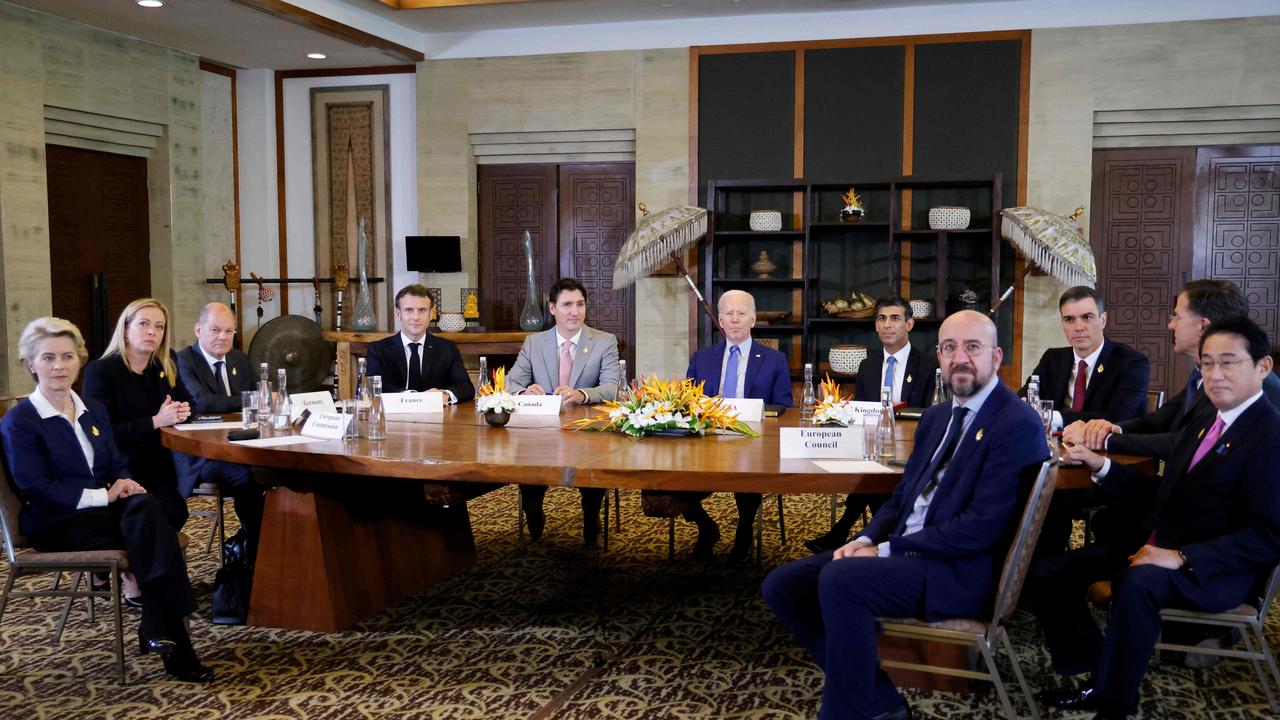
Australian Prime Minister Anthony Albanese held formal talks with EU leaders at the G20 on Wednesday, where he described the missile strikes on Ukraine as “deeply concerning”.
“Russia’s reckless and dangerous use of force promote danger for the entire region and we’ve seen that overnight,” he said.
The Prime Minister also offered his condolences to Poland for the loss of life.
“What we know is Russia‘s aggression against Ukraine is having devastating consequences for the people of Ukraine but it’s also creating instability throughout the region,” he said.
“There’ll be an investigation of course … and then a further … appropriate response.”
Mr Albanese also met with India’s Prime Minister Narendra Modi, new UK Prime Minister Rishi Sunak and French President Emmanuel Macron, where he discussed a range of trade and security issues.
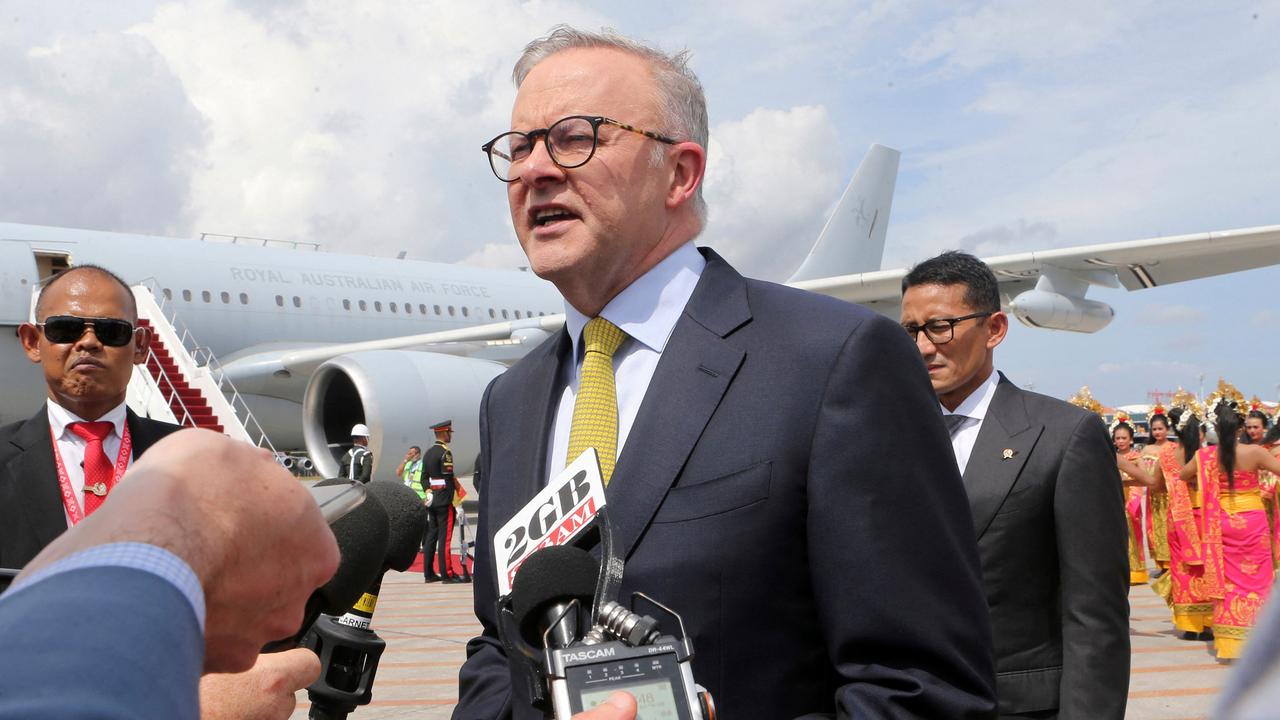
He confirmed the meeting with Mr Sunak involved extensive conversations about the AUKUS security agreement, including the timetable for Australia securing nuclear-powered submarines from either the UK or US.
Mr Albanese said “greater co-operation in defence and security” was be a key theme of his discussion with Mr Macron.
At the start of the meeting the French President told Mr Albanese: “I completely agree with you on the strategic approach to Indo Pacific strategy.”
US President Joe Biden described Russia’s attacks as “totally unconscionable”.
“The moment when the world has come together at the G20 to urge de-escalation Russia chose to escalate in Ukraine – while we were meeting,” he said.
“There were score and scores of missile attacks in western Ukraine.
“We support Ukraine fully in this moment, as we have since the start of this conflict, and we will continue to do whatever it takes to give them the capacity to defend themselves.”
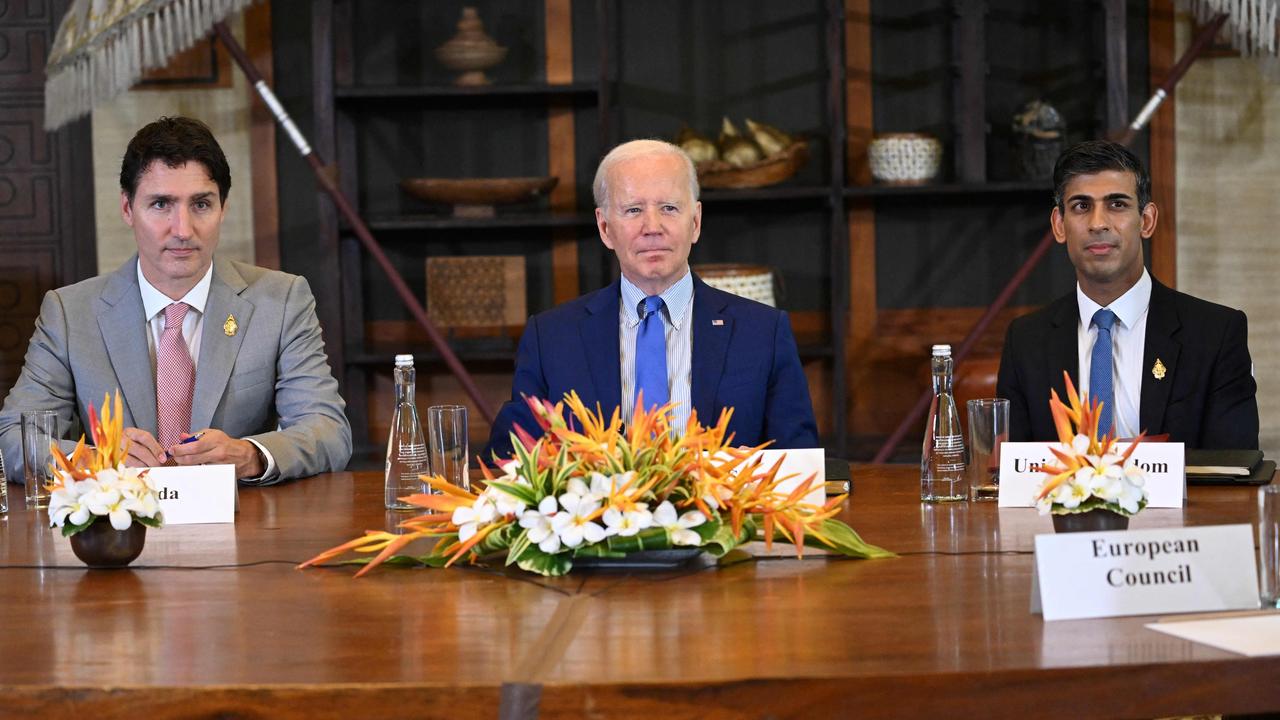
Asked about claims the explosion in Poland was linked to Russia, Mr Biden said there was “preliminary information” that contested that.
“I don’t want to say that until we completely investigate it, but it is unlikely in the lines of the trajectory that it was fired from Russia but we’ll see,” he said.
RUSSIA RAMPS UP DEADLY ATTACKS
Russia unleashed a fresh series of deadly missile strikes on cities across Ukraine on Tuesday, including Kyiv, striking multiple residential buildings.
The barrage of what Ukraine said was around 100 missiles targeted the country’s energy network, leading to power outages as winter closes in.
It marked the highest number of missiles launched in a single day since the beginning of the war, according to Yuri Ignat, Ukraine’s air force spokesman.
Previously, the highest number of missiles fired in one day during Russia’s war on Ukraine, was 84 missiles launched on October 10.
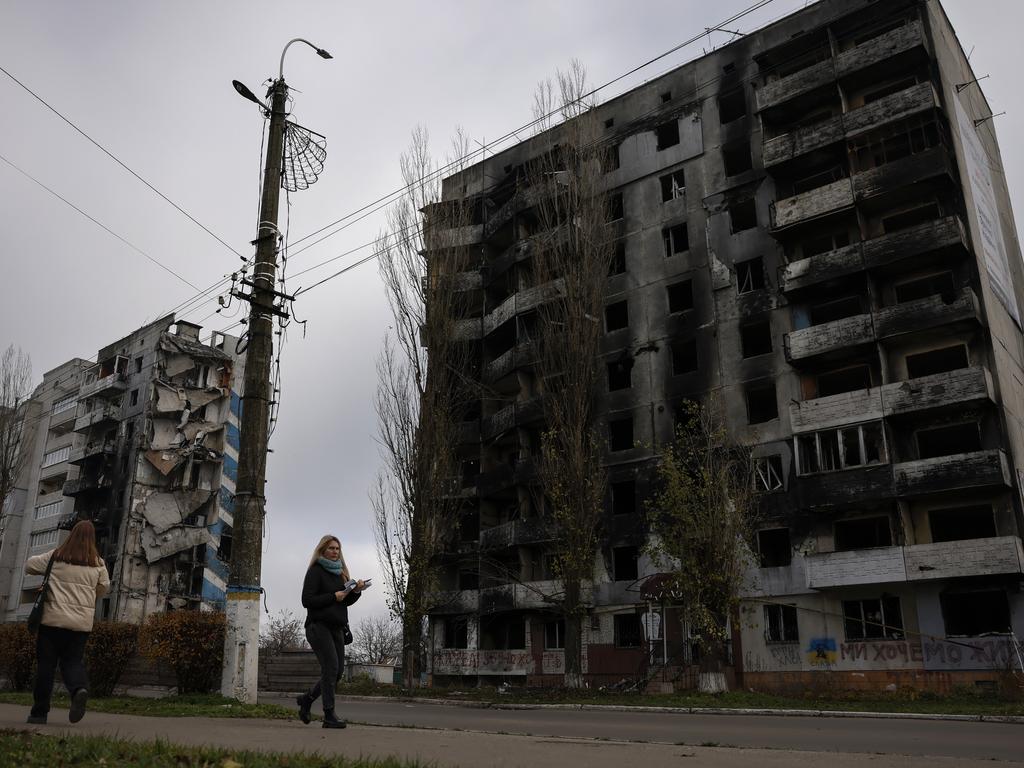
Kyiv mayor, Vitaliy Klitchko, said two residential buildings in the capital city were hit and several missiles were shot down by air defence.
Unverified videos circulating showed an apartment block engulfed in flames.
Mr Klitchko said at least one person was killed during the afternoon strikes on the city’s centre and nearly 50 per cent of Kyiv remained without power.
The deputy head of the Ukrainian Presidential Office, Kyrylo Tymoshenko, said that more than seven million Ukrainians are without electricity as a result of the barrage of missile attacks.

Mr Tymoshenko said that 15 facilities of Ukraine’s energy infrastructure had been damaged during the Russian missile strikes, but Ukrainian air defences had shot down 70 of more than 90 missiles fired at Ukraine.
The Lviv region lost 80 per cent of its electricity supply in the attack, according to Andriy Sadovyi, the mayor of Lviv. The city’s heating and hot water supply has also stopped and there are mobile service interruptions, he said.
Mr Sadovyi warned residents to stay in shelters.
The head of the regional administration in Kharkiv confirmed strikes in that region.
Ukrainian media reported that people in the Zhytomyr region were without power after strikes. And there were also unconfirmed reports of explosions in Rivne and Kryvyi Rih.
UKRAINE’S 10-POINT PLAN TO END INVASION
The strikes came as G20 leaders meeting in Bali, Indonesia, were discussing the impact of the war on the global economy, driving up food and energy prices worldwide and raising fears over Moscow’s threats to deploy tactical nuclear weapons.
Ukrainian Prime Minister Vladimir Zelenskyy outlined a 10-point peace plan to end Russia’s invasion of Ukraine in a video speech to G20 leaders in Bali, Indonesia.
“Russia’s response was another wave of missiles,” US Secretary of State Antony Blinken said. “These attacks will not break Ukraine’s will — we will be with Ukraine for as long as it takes.”
White House National Security Adviser Jake Sullivan said Russia is again trying to destroy Ukrainian critical infrastructure.
“The United States strongly condemns Russia’s latest missile attacks against Ukraine, which appear to have struck residential buildings in Kyiv and additional sites across the country,” Mr Sullivan said in a statement.
“These Russian strikes will serve to only deepen the concerns among the G20 about the destabilising impact of Putin’s war.
The United States and our allies and partners will continue to provide Ukraine with what it needs to defend itself, including air defence systems
“We will stand with Ukraine for as long as it takes.”
The missile attacks targeting Ukrainian cities “shows only Putin’s weakness,” British Foreign Secretary James Cleverly said on Tuesday during the G20 summit in Bali, Indonesia.
“The callous targeting of Ukrainian cities with more sickening missile attacks today shows only Putin’s weakness,” Cleverly said in a tweet.
“Putin is losing on the battlefield and – as we saw today at the G20 – diplomatically too.
– with Justin Vallejo, Ellen Ransley and AFP
More Coverage
Originally published as G7 leaders meet as Poland, Hungary hold crisis meetings after deadly missile strike








